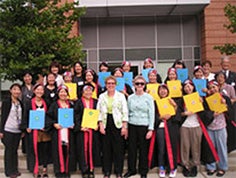College of Nursing hosts students from Hiroshima
Strolling across the Anschutz Medical Campus, you might expect to see individuals wearing stethoscopes and scrubs. Seeing about two dozen young Japanese women wearing distinct black robes with colorful bands might cause double-takes.
The CU College of Nursing recently hosted 16 nursing students and six faculty from the Japanese Red Cross Hiroshima College of Nursing. The students who visited the college as part of an international course they take with their bachelor’s degree program in Japan. CU also hopes to take its students to Japan sometime in the future.
“Colorado has a strong emphasis on evidence-based practice, quality and safety in nursing and health care,” noted Kathy Magilvy, Ph.D., R.N., F.A.A.N., professor and associate dean for academic programs. “Those are landmarks for us. International students may learn about this in their classrooms, but when they come here, they see it in practice in hospitals and learn about it from our expert faculty who give lectures to the visiting students. It expands their possibilities as a nurse.”
July's visit was the third time students and faculty have traveled from Hiroshima to Denver. Diane Lenfest, director of the College of Nursing International Program said these students attended an educational program consisting of presentations by college faculty, visited University of Colorado Hospital and Children's Hospital Colorado, toured the nursing school’s Clinical Education Center – Skills and Simulation Labs, in Education 2, as well as CAPE and the Health Sciences Library.
The visit ended with a farewell reception where the students performed a dance in their robes.
“One of the most important things I think visiting students get from their trips here is exposure to a variety of types of practice and settings that they may not see in their own communities and countries,” Magilvy said. “They get to compare what they’ve been taught to a different world view. We also expose students to the possibilities of graduate education, which enforces what their professors have been telling them about the need for advanced education.”
These visits are a two-way street, Magilvy said. “I also believe that having them here is good for us. During conversations over lunch, in a lecture or during a tour, we learn about nursing practice and education in other countries. We get from them an exposure to global nursing and sharing of cultures.”
The visit represents a larger professional exchange program that has been in place for the past decade and has been developed and managed by the college's International Program. Lenfest has worked since 2000 to expand cooperative (exchange) agreements for the college with numerous international nursing schools that have brought many of their students and faculty for visits. The College of Nursing hopes that some of the visiting students will return one day as students in one of our graduate degree programs.


